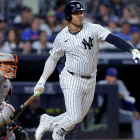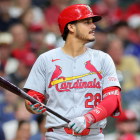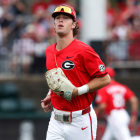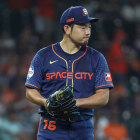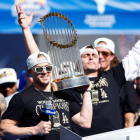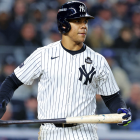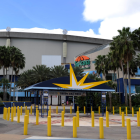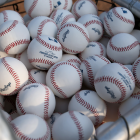Powered by early runs and Jack Flaherty's seven shutout innings, the Los Angeles Dodgers throttled the New York Mets 9-0 in Game 1 of the National League Championship Series on Sunday night. The victory gives the Dodgers a 1-0 lead in the best-of-seven series that will determine which team advances to the World Series to face the New York Yankees or the Cleveland Guardians.
The Dodgers jumped out to a first-inning lead thanks to a two-out, two-RBI single by Max Muncy. L.A. increased that lead with a run in the second inning, and then broke it open with a three-run fourth. That bottom of the fourth saw Shohei Ohtani drive in a run on a double that left the bat at 116.5 mph:
Soon after, Ohtani, who reached base three times in Game 1, scored on Freddie Freeman's two-out single. At that point, the Dodgers led 6-0. The score held until the eighth, when Mookie Betts' bases-loaded double made it 9-0.
Now for some takeaways from NLCS Game 1.
L.A. pitching is on a record-setting roll
Flaherty, Daniel Hudson, and Ben Casparius combined for the Game 1 shutout. That comes after the Dodgers blanked the Padres in Games 4 and 5 of the NLDS. Indeed, the Dodgers haven't allowed a run since the second inning of Game 3 against San Diego. All of that plus their suffocating of the Mets means Dodgers pitchers (and fielders) have made postseason history.
Longest scoreless inning streaks MLB postseason history
T1. 2024 Los Angeles Dodgers: 33 innings (and counting)
T1. 1966 Baltimore Orioles: 33 innings
3. 1974 Oakland Athletics: 30 innings
With a scoreless first inning in Game 2 on Monday, they'll stand alone at the top of that list. Especially huge and probably unexpected was Flaherty's seven innings of shutout work (2 H, 6 SO, 2 BB). That was just the second time this season that Flaherty worked at least seven innings. Sunday's gem also came one start after Flaherty was knocked around for four runs in 5 1/3 innings against the Padres in NLDS Game 2. On Flaherty's part, Game 1 against the Mets was a timely occasion to find his level.
Kodai Senga had no control
The Mets in Game 1 put their hopes on the right-hander Senga, but those hopes turned out to be misplaced. Senga was not expected to work deep into the game – he made only one start in the regular season because of injuries and worked just two innings in his lone NLDS start – but getting through the L.A. order perhaps one full time and change without serious damage was a reasonable expectation. That didn't happen, and the leading culprit was Senga's lack of control. Senga lasted just 1 1/3 innings, and over that brief span he walked four batters, all in the first inning, with no strikeouts. In related matters, Senga also allowed three runs in those 1 1/3 innings. Of his 30 pitches, just 10 (!) went for strikes, and thirteen of his first 16 pitches weren't in the zone.
Because of Senga's inability to find the zone, the Mets had to work their bullpen hard in Game 1, and the NLCS as a best-of-seven doesn't provide as much rest, at least in proportional terms, as the LDS does. Coming into this series, the Mets' relative stability in the rotation, at least compared to the Dodgers and their three healthy starters, seemed to be an advantage. That may not be much of an advantage after Senga in Game 4 recorded just four outs while his counterpart Flaherty worked seven innings.
History favors the Dodgers
As you would expect, winning the opener of a postseason series gives a bid edge to the team that did the winning. Across all best-of-seven postseason series in MLB, the team that wins Game 1 goes on to win the entire series 64.4% of the time. Teams in the Dodgers' exact circumstances – i.e., winning Game 1 at home – fare even better: they go on to win the series in question 68.2% of the time. For the Mets, though, all it takes is a Game 2 win, and then we're back to even.
Up next: NLCS Game 2 is scheduled for Monday back at Dodger Stadium. Lefty Sean Manea will go for the Mets, while Dodgers manager Dave Roberts has yet to disclose his pitching plans (he might opt for a bullpen game thanks to Flaherty's heavy lifting in Game 1). First pitch is scheduled for 4:08 p.m. ET. In that game, the Dodgers will be trying to become the first team ever to throw four straight postseason shutouts.



